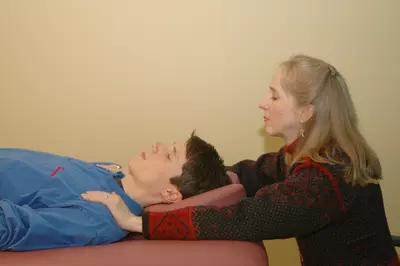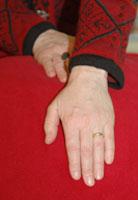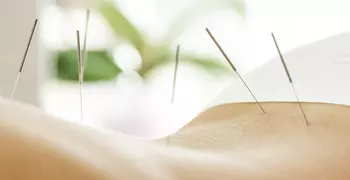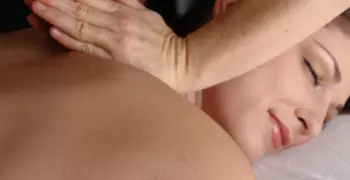Reiki

How Can I Find a Qualified Reiki Practitioner?
There are many ways to find a reliable person to perform Reiki on you.
Ask a friend who does Reiki.
Although today people are accustomed to receiving healthcare from professionals, this is not necessary with Reiki. No special background or credentials are needed to receive Reiki training. Reiki originated as a folk healing practice, and if you have a friend who is trained and who practices on himself/herself regularly, you may want to receive Reiki from your friend. If you are happy with that experience, you can continue with your friend or contact your friend's Reiki master.
Find a healthcare professional who does Reiki.
 If you don't have a friend who does Reiki, you can look for a Reiki practitioner in private practice or a healthcare environment. In recent years, Reiki practitioners are increasingly setting themselves up as professionals in private practice or offering Reiki in healthcare environments. In addition, more healthcare institutions are incorporating Reiki into their model of care. According to the American Hospital Assocation, over 800 U.S. Hospitals offered Reiki as part of their hospital services in 2007. The Center for Reiki Research web site provides a list of 71 hospitals, medical clinics, and hospice programs where Reiki is offered as a standard part of care. Many nurses and other healthcare professionals offer Reiki as part of their patient care, either through integrating moments of Reiki touch into routine care or through longer Reiki sessions. A hospital stay may offer the first opportunity to experience a Reiki session.
If you don't have a friend who does Reiki, you can look for a Reiki practitioner in private practice or a healthcare environment. In recent years, Reiki practitioners are increasingly setting themselves up as professionals in private practice or offering Reiki in healthcare environments. In addition, more healthcare institutions are incorporating Reiki into their model of care. According to the American Hospital Assocation, over 800 U.S. Hospitals offered Reiki as part of their hospital services in 2007. The Center for Reiki Research web site provides a list of 71 hospitals, medical clinics, and hospice programs where Reiki is offered as a standard part of care. Many nurses and other healthcare professionals offer Reiki as part of their patient care, either through integrating moments of Reiki touch into routine care or through longer Reiki sessions. A hospital stay may offer the first opportunity to experience a Reiki session.
One good strategy for finding a practitioner is word of mouth. Local practitioners of complementary therapies (such as acupuncture, shiatsu, reflexology, massage, herbalism, homeopathy, etc.) usually know one another by reputation and sometimes they share offices or cross-refer.
Look in your community.
As with finding a Reiki teacher, you can also try looking at community bulletin boards in yoga studios and health food stores. In addition, your local hospital may have a complementary or integrative medicine service. Since Reiki is used by many people to cope with chronic illness, any local organization that offers services to people with illnesses such as cancer, HIV, fibromyalgia, or diabetes may have a list of community resources or even sponsor a Reiki clinic.
How do I evaluate their qualifications?
Once you've found a Reiki practitioner, how can you gauge qualifications? What should you look for? Because the Reiki profession has grown out of a grass roots movement rather than emerging from academic healthcare programs, many different perspectives and practice styles have developed without oversight, and there are no common standards of education or treatment that are agreed upon across all practice styles.
 Although Reiki masters often give their students certificates, these certificates are not supported by educational standards that have been agreed upon throughout the Reiki community. Therefore the possession of a certificate is no guarantee that the practitioner has thorough training. You need to ask some specific questions to determine training and experience.
Although Reiki masters often give their students certificates, these certificates are not supported by educational standards that have been agreed upon throughout the Reiki community. Therefore the possession of a certificate is no guarantee that the practitioner has thorough training. You need to ask some specific questions to determine training and experience.
What are some questions I should ask?
If you decide to seek Reiki from a professional, look for someone who has been trained over a period of time and who has ample experience giving Reiki to other people. Most important is that the practitioner practices Reiki self-care every day, as this is how the practitioner develops her relationship with Reiki and deepens her/his understanding.
Professional practitioners usually create a brochure and/or website that explain their training and practice guidelines. Look for the answers to the following questions, and any others you might have:
Questions |
Answers to Look For |
| What is your level of training (First or Second degree or Reiki master)? | You can receive hands-on Reiki from someone at any level of Reiki training. If you are looking for distant healing, you need a Second degree practitioner. If you want to learn how to practice Reiki yourself, you need a Reiki master. |
| When were you trained? | This will give you a sense of how long the person has been practicing, although it also depends on how much she practices. For example, someone who learned Reiki five years ago but uses it infrequently would be less appealing than someone trained more recently who practices daily. |
| How long were the classes? | Eight to twelve hours for First degree and another eight to twelve hours for Second degree training allows time for both instruction and actual practice in class. Classes offered in a 2-3 day format provide more practice time. |
| For Second degree practitioners or Reiki masters: were you trained to each level in separate classes, and if so, how far apart were the classes? | Preferably, the Second degree training occurred a minimum of three to six months after the First degree class. This would give the practitioner ample time to become grounded in hands-on practice before learning the more involved and abstract distant healing techniques. Some Reiki masters require a minimum of 1 year between First- and Second-degree Reiki classes. Practicing an additional one to two years before becoming a Reiki master is the minimum desired; traditional Reiki masters often require students to have even more experience. |
|
What is your clinical experience-to whom have you given treatment, in what settings, and for how many years? |
If you are looking for a professional practitioner, it is reasonable to expect years of experience giving Reiki, not only to family and friends, but to people beyond the practitioner's social circle who are experiencing varying levels of health and wellness. Some Reiki practitioners may have worked as Reiki hospital volunteers before starting their own practices. |
| How do you describe Reiki? | This should not be a difficult question for a professional practitioner to answer. You don't want to sense that he or she has never thought about this before. The practitioner hould be able to describe the practice clearly and authoritatively.
Be wary of practitioners who make claims of curing disease or who disparage conventional healthcare. The practitioner's response to this question is often when you start getting a good sense of the practitioner as an individual and if you will feel comfortable with him or her. |
| Describe your sessions, including length of time and fee. | You'll want someone who clearly describes the process and how he or she structures the session so you have an idea of what to expect. (An experienced professional will repeat this information at your initial appointment.) Ask if the practitioner includes practices other than Reiki in the session and specify if you want Reiki only. (Consider: if you don't have a Reiki-only session, how can you tell if it is Reiki that is benefiting you?) |
| Do you practice Reiki on yourself everyday? | This is the most important question. Look for someone who practices Reiki self-care every day, as this is how the practitioner's relationship with Reiki continues to expand and deepen. |
If the above information is not readily available, it is reasonable to briefly interview a prospective practitioner on the phone or through email. A credible practitioner will welcome this inquiry.
What does Reiki cost?
Currently Reiki is only covered by health insurance when it is part of a treatment such as physical therapy, massage, or palliative care that is covered by your insurance or when it is delivered by a nurse or licensed care professional as part of routine care during a hospital stay. So, if you visit a Reiki practitioner, plan on paying out of pocket.
The cost of a session varies according to the experience of the provider, whether or not they are professionals in full-time public practice, and the local economy, but fees are generally upward of $50-75 for a session. Reiki students may offer Reiki for a lower fee as they gather clinical experience, and there are also Reiki clinics or community circles where sessions are available by donation or for a low fee.
Barnett, L., & Chambers, M. (1996). Reiki Energy Medicine: Bringing Healing Touch into Home, Hospital, and Hospice. Rochester, Vermont: Healing Arts Press.
The Center for Reiki Research: Including Reiki in Hospitals. Retrieved February 22, 2012, from http://www.centerforreikiresearch.org
Kryac, E., & Vitale, A. (2011). Reiki and its journey into a hospital setting. Holistic Nursing Practice. 25(5), 238-245.
Miles, P., True, G. (2003). Reiki-Review of a Biofield Therapy: History, theory, practice and research." Alternative Therapies in Health and Medicine. 9(2):62-72.
Starr, B. (2007) Reiki: Learning to do it. Retrieved October 7, 2008, from http://www.religionandspirituality.com/view/post/11709123755600/Reiki_Learning_to_do_it/

